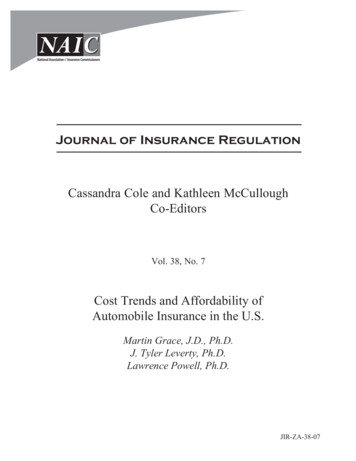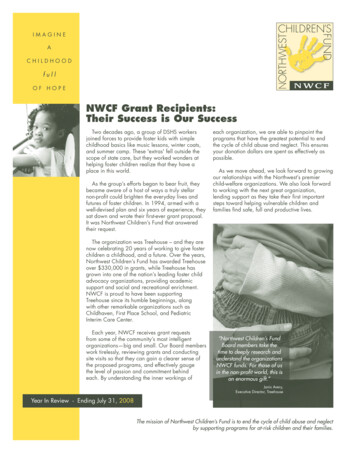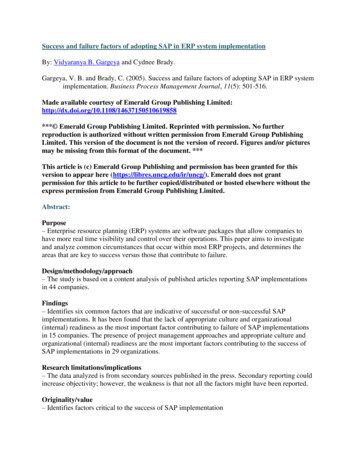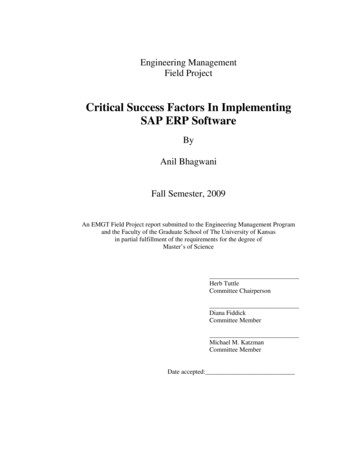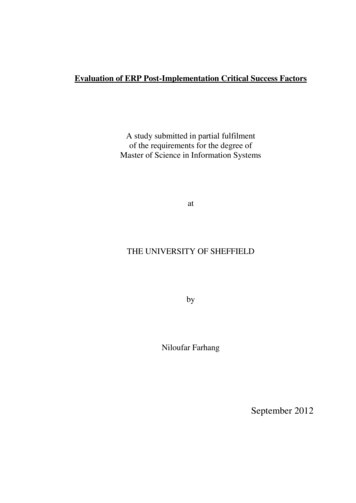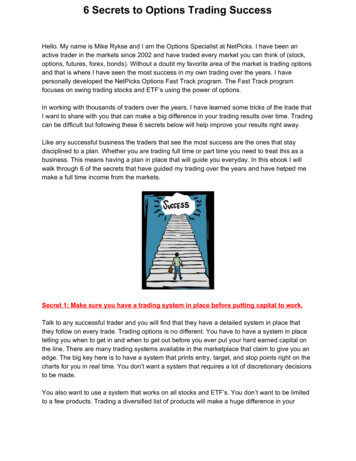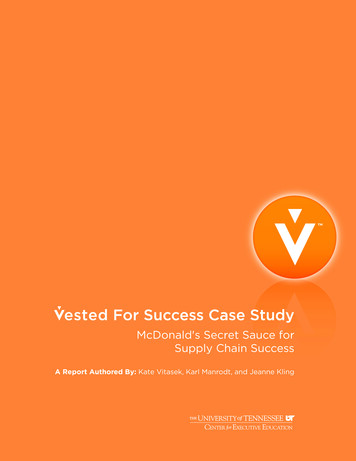
Transcription
MAY2013BOOK SUMMARYbY tHe eDitOrs OF SUCCESS MagaZineMaking HabitsBreaking HabitsWhy We Do Things, Why We Don’t, and How to Make Any Change Stickby Jeremy Deanout With the bad,in With the GoodGet the completeaudiobook in theSUCCESS StoreSUCCESS.comDe Capo Press 2013, Jeremy Deanisbn: 9780738215983253 pages, 26.00How to Gain Greater Control Over YourLife by Reducing HabituationQUICK OVERVIEWWhy is it that no matter how hard you try to stop going to the refrigerator and “grazing” after a stressful day atwork, you can’t seem to give up that unhealthy habit? And why is it that even though you have promised to addmore exercise to your daily routine, it seems you can never squeeze in the time? Jeremy Dean has the answersto these and a host of other questions related to habits in his new book, Making Habits Breaking Habits: Why WeDo Things, Why We Don’t, and How to Make Any Change Stick.Not only does Dean explain why change can be so hard, but he provides a number of tips and strategies forSUCCESS Pointsovercoming the powerful (and too often automated) pull of our unconscious brains. In Making Habits BreakingFrom this book you’ll learn:productivity, and he also explores ways to develop new habits that will help one get ahead at work and in life. How to become moremindful and, thus, reducebad habits How to spur creativityby breaking oldthought patternsHabits, he shows how forcing one’s self out of habitual practices can increase creativity and even boostAPPLY AND ACHIEVEIt’s easy enough to recognize that certain habits are bad, such as watching too much TV, taking theelevator instead of the stairs and eating too many sweets. We know habits can be deadly, especially if you’rein a workplace where automation kills oversight. In Making Habits Breaking Habits, Dean points to a study ofthe nation’s healthcare system that showed patients experience 1.5 million preventable injuries annually due How to trick your braininto adopting new habitsmore easilyto medication errors alone. How to acquire moresatisfaction fromhealthy habitsis to decrease automation. An Australian physician, Dean points out, found that introducing checklistsWhat’s the problem?Likely it’s habits. Medical staffs get stuck in routines and forget to think through situations. The solutionat a hospital increased staff compliance with critical, often life-saving procedures by 50 percent. Similarscenarios have occurred with airlines.Are you at risk of making critical, if not deadly, mistakes due to your habits? Chances are the answer is“yes.” But the good news is you can change that by being mindful in the moment.Page1SUCCESS.comSUCCESS book SUmmariES
summaryMaking Habits Breaking HabitsHDON’T THINK, JUST DO IT!ow long does it take to form a new habit? How longOur habits are built up quite simply in response to rewards from theshould it take before it becomes a part of your routine rather thanenvironment. For example, my job pays me money, which I want, andsomething you have to force yourself to do?I learn from the environment that if I work harder, I can get promotedThanks to recent research, we now have some idea of how longand get more money. So, I develop a work ethic. Or, I want to be likedcommon habits really take to form. In a study carried out at Universitymore and I notice that smiling helps, so I start smiling more. And myCollege London, 96 participants were asked to choose an everydayhabit of smiling at people is born and so on. All the time, I’m noticingbehavior that they wanted to turn into a habit. They all chose something(whether consciously or unconsciously) that a certain type of behavior isthey didn’t already do that could be repeated every day; many wererewarded, and the more it is rewarded, the more I perform the behavior inhealth-related: people chose things like “eating a piece of fruit withthe same situation.lunch” and “running for 15 minutes after dinner.” Each of the 84 days ofthe study, they logged into a website and reported whether or not they’dcarried out the behavior, as well as how automatic the behavior had felt;acting without thinking, or “automaticity,” is a central component ofa habit.The simple answer is that, on average, across the participants whoOur habits are built up quitesimply in response to rewards fromthe environment.provided enough data, it took 66 days until a habit was formed. And,contrary to what’s commonly believed, missing a day or two didn’t muchaffect habit formation.What emerged from this study, as it has from others, are three mainHabits of thought and behavior can be activated automatically by peopleand things around us. We are continually being bombarded by subtle—andcharacteristics of a habit. The first is that we’re only vaguely aware ofsometimes none too subtle—cues about how to behave. We processperforming them.these automatically and unconsciously, and those impulses emerge as ourActivities we once considered painful, like getting up early to gohabits, which we start performing without conscious thought.to work, become less so with repetition. On the other hand, activitiesWe have plans, goals, and dreams, as well as desires and drives: it’s whywhich excite or give us pleasure initially, like sex, beer, or listening tohuman life is so complicated. The catch is that our goals and desires can beBeethoven’s 7th, soon become mundane. Of course, we fight against theactivated unconsciously at the wrong time by the people or things around us.leaking away of pleasure, sometimes with success, by seeking variety.The problem for making and breaking habits is that so much isThis is why some people feel they have to keep pushing the boundarieshappening in the unconscious mind. Since the unconscious is generallyof experience just to get the same high.like the Earth’s core, impenetrable and unknowable, we can’t access itWe tend to do the same things in the same circumstances. Indeed,directly. This means that deeply held goals and desires can come intoit’s partly this correspondence between the situation and behavior thatplay without our realizing. Not only this but our conscious intentionscauses habits to form in the first place. New surroundings don’t haveto change can prove too weak in the face of the behaviors we performall the familiar cues to our old habits. Without these cues, our autopilotefficiently and automatically, with only minimal awareness.doesn’t run so smoothly and our conscious mind keeps asking us whatto do.The rather bland word “context” can also include other people.The Daily GrindIf new experiences are so exciting, then why aren’t we all dice men andWhether we notice it or not, we are heavily influenced by thosewomen? Why don’t we give ourselves up to randomness to escape thearound us.confines of habit? Routine boosts feelings of safety.Page 2SUCCESS.comSUCCESS book summaries
Making Habits Breaking HabitsIt’s not just behavioral routines that we feel more comfortable with; it’s also intellectualroutines. Routines reduce the stress associated with much-practiced mental processes becausethey can be performed easily and unconsciously.Is WorryingAlways Bad?One of the vital differencesbetween constructive andunconstructive worrying ishidden in the character ofthought. Things tend to gobetter if worry prompts problemsolving than if it promptsexistential crisis.Not all repetitive thoughts arenegative. At the other endof the spectrum are positivehabitual thoughts. We’velooked at the self-servingbias as one manifestation ofrepetitive positive thinking; thisis a habit of thought that helpsus see ourselves and thosewe love in a more positivelight. There are many othertypes of positive thought; forexample, repeatedly thinkinghow lucky you are, letting yourmind wander back to happymemories, and having pleasantdaydreams. With practice, wecan train ourselves to performthese ‘happy habits’ regularly soas to break out of a depressingloop and improve our everydayexperience.The very fact that habits are so easy to perform makes them attractive. People are whatpsychologists call “cognitive misers”: for the most part, we prefer to avoid difficult decisions.So it’s partly the mental costs of switching that puts us off. Habits, on the other hand, canliterally feel good. When we can quickly choose a product with minimal thought, we feelmore successful.STUCK IN A DEPRESSING LOOPWe all of us worry and we all want to feel safe. Because habits can provide this reassurance—but they can also get out of control—they are both savior and curse.Studies continue to support this idea that depression is at least partly a result of this habitual wayof thinking. One large study assessed the thinking styles of 5,000 students and followed them up overtwo years. From this sample, 173 students demonstrated this particularly pessimistic way of makingsense of the world. Of these, 17 percent went on to have serious depressive episodes. In the remainderof the students, the rate was only 1 percent.If this attribution bias can help explain why some people get depressed, how can we explain why therest of us don’t?What we find is that people repeatedly rate themselves somewhat more highly than others aroundthem. We tend to believe we are more charitable, cooperative, and kinder while being less lazy,deceitful, or belligerent than other people. People display the self-serving bias in both their abstracttraits as well as in their specific behavior.The habit of thinking positively about yourself in relation to other people is strong wherever youlook. Except in one place. People who are depressed don’t tend to have a self-serving bias—in fact,they see themselves relatively accurately, which may well be part of the problem. That’s not becausedepressed people are bad people, far from it, just that the rest of us seem to need to see ourselves withrose-tinted glasses to get by.However, while habitual ways of thinking are central to depression, anxiety, and other mental healthproblems, they can’t explain everything. What they do is provide excellent examples of how habitualways of thinking can either bog us down or, in the case of self-serving bias, help pull us out of trouble.For those of us who would like to change more modest patterns of thought, though, there isclearly hope. But even for less persistent habitual thoughts, the same challenges are likely topresent themselves. Namely, (1) we are likely to be unaware of either some or all of our habitualthought processes; and (2) the habit will resist change because it is automatically cued bysituations or other thoughts. The reason why we might want to change patterns of thought issimply that they aren’t doing us any good.Page3SUCCESS.comSUCCESS book summaries
Making Habits Breaking HabitsMAKING HABITSDeveloping a good habitWith some honorable exceptions, people achieve great things bywill be most successfulworking steadily and regularly toward their goals. There has to be anwhen we do it for its ownultimate goal that is really worth achieving or the habit will be almostsake, when it’s doneimpossible to ingrain. What we find in the research is that whenautomatically, and when wepeople’s goals start to weaken, or are weak in the first place, it’s verytake satisfaction in whatdifficult to start forming a new habit.we’ve achieved.Expecting success is about being practical. We have to thinkThe beauty of habits isDeveloping agood habit will bemost successfulwhen we do itfor its own sake,when it’s doneautomatically,and when wetake satisfactionin whatwe’ve achieved.carefully about what is really possible. One way of making itthat, as they develop, theymore obvious what kinds of habit change are possible is by usingbecome more effortless.visualization. As opposed to fantasizing a more effective way ofEven when you’re tired, upset, or distracted, strong habits are likelyvisualizing the future is to think about the processes that are involvedto be performed because they’re so ingrained. Habits that you’vein reaching a goal, rather than just then end-state of achieving it.constructed yourself, for you own purposes, can seem like magicIf you’re finding the mental contrasting difficult, then try thewhen they work. Like other behaviors that we carry out on a regular“WOOP” exercise. WOOP stands for “Wish,” “Outcome,” “Obstacle,”basis, the fruits of good habits may build up slowly, but they canand “Plan.” First, you write down your Wish, the habit you want torepay the effort made to establish them many times over.achieve; then, the best Outcome of your habit; then, the Obstacle(s)you are likely to face. Finally, you make a specific type of Plan calledan implementation intention, which is described in detail below.So, instead of saying to ourselves “I intend to get kinder or fitter,”Happy HabitsOne of the goals of habit change is to make ourselves happier. Wemight be trying to improve our work habits so we can get more donewe should say “If I see someone struggling with a stroller, then I willin less time or our socializing habits so we can spend more timeoffer them help”; or “If I’m about to get in the car for a short trip, thenwith friends and family. Good habits can do all sorts of things for us,I should walk.” This links a particular situation with a response, anbut will they make us happy?action. Recall that what we want is a strong linkage between a specificHuman beings are wonderfully adaptable and we adapt to oursituation and an action—once this connection is automatic, we’ll havenew circumstances, whether better or worse, with frighteninga new habit.speed. Studies have shown that when we rationalize events, it helpsBuilding a new habit means repeating the thought or behavior inreduce their emotional impact. This process of making meaninga stable context. Each time it is repeated, we go a little way towardout of the things that happen to us is automatic and at least partlyincreasing the habit’s automaticity. Exactly how many repetitions areunconscious. But along with these explanations is also the idearequired will depend on your lifestyle and the exact habit you’re tryingthat as our new circumstances produce habits, their performanceto develop.becomes unconscious. We stop noticing and taking pleasurePsychologists have looked at the factors that affect whether ornot we keep going. As you’d imagine, satisfaction with the newhabit is right up there. Consciously or otherwise, we ask ourselvesfrom positive changes in our circumstances because they’ve beenincorporated into our automatic routines.The study of happy habits has something very important to teachwhether our new habit is really how we imagined it. A feeling ofus. It is a reminder that good habits we already have—and newsatisfaction is like a message from our unconscious that we’rehabits we choose to break in—can easily become forgotten partsgoing in the right direction, while dissatisfaction signals thatof our routines. Things we used to take pleasure from, like makingsomething is wrong.a cup of tea or walking around the block, with time, can becomePage4SUCCESS.comSUCCESS book summaries
summaryMaking Habits Breaking Habitsbland and emotionless. As automaticity increases, our experienceof being in the moment recedes; we feel less alive, fail to notice theworld around us, and become disconnected from our experience.Our minds travel off elsewhere, away from what we’re doing andtoward ruminating about the past and worrying about the future.As automaticity increases,our experience of being inthe moment recedes; wefeel less alive, fail to noticethe world around us, andbecome disconnected fromour experience.Automatic, unconscious habits only set us off in the rightdirection; it is up to our conscious, willed, creative selves to decidewhere we are going and how we will get there. Habits can be a forcefor personal conservatism: if they take complete control, they canour full potential. The challenge is to work out which habits keeplock us into the same boring grooves. Habits can also set us freeleading to dead-ends and which habits lead to interesting newfrom the routine aspects of everyday life and allow us to realizeexperiences, happiness, and a sense of personal satisfaction.Breaking Habits Through MindfulnessThe strange thing about habits is that because we perform them unconsciously, we aren’t always awareexactly what they are. We might well be aware of the results of bad habits, such as being overweight, orcontinually missing deadlines, but how we got into the situation isn’t so clear.The very first step in breaking a habit is to get a handle on when, how, and where we are performing it. Oneself-contained method is to use mindfulness. Being mindful is about living in the moment. In many ways,it’s the exact opposite of our experience while performing a habit. Mindfulness is all about increasing yourconscious awareness of what you are doing right now. It’s often talked about in the context of meditation, butreally, it is a way of life or an attitude. Those who practice living in the moment say that it can give you a newway of experiencing life. Some psychologists have called it reperception. Reperceiving allows us to observeour automatic reactions to events and see them clearly in context. We become more intimate with ourselvesby just noticing our interpretations of the world, rather than becoming caught up in them.Since mindfulness is such a useful mental state for habit detection, here’s a quick primer on mindfulnessmeditation. You don’t need to be meditating to spot your habits; this is about practicing the right state of mind.1. Relax the body and mind. This can be done by clearing a time, sitting comfortably, possiblyputting on some soothing music, and using any other (non-pharmacological) tricks for calmingdown that work for you.2. Concentrate on something. Often, meditators concentrate on their breath, the feel of it goingin and out, but it could be anything: your feet, a potato, a stone.3. Be mindful. This is a little cryptic, but it means something like this: don’t pass judgment onyour thoughts, let them come and go as they will (and boy will they come and go!) but try tonudge your attention back to its primary aim.Page5SUCCESS.comSUCCESS book summaries
Making Habits breaking HabitsAbout the AuthorJeremy Dean is a psychologist and founder/author of the popular website “PsyBlog,”which draws more than 1 million readers a month. Designed to break down complexpsychological studies and make them accessible and useable for people in everyday life,the blog has been featured in The New York Times, BBC News, The Los Angeles Times,The London Times, and on NPR. Dean has two higher degrees in psychology and iscurrently working on his doctorate. Making Habits Breaking Habits is his first book.Action StepsGet more out of this SUCCESS Book Summary by applying what you’ve learned. Here are afew questions, thoughts and activities to get you started.1. Practice mindfulness (and getting out of mundanehabits) by doing simple things like brushing yourteeth with a different hand or placing your coffeemug on the right instead of the left side of your desk.other way of soothing anxiety—like taking a walk orenjoying a hot bath.2. Spur creativity by asking for ideas and problemsolving from people outside your industry or area ofexpertise.5. To keep pleasurable activities from becomingmundane, engage in them with mindfulness. Whilereading a book in the evening, note the taste of thetea you are drinking, the feel of the pages in yourhands.3. Make new habits stick by linking them to otherhabitual activities. If you want to start jogging everyday, then say, “I will jog every evening after I eatdinner.”6. Choose to be aware of all the sensations of yourpresent activity. That will not leave you brain spacefor worrying about the past and future and willensure great happiness “in the moment.”4. Recognize that bad habits are often linked to specificenvironments or circumstances. If you tend toovereat only when you are stressed, then find some7. To make goal achievement easier, don’t just envisionyour success once you achieve the goal. Visualizethe process of reaching the goal.Recommended ReadingIf you enjoyed the summary of Making Habits Breaking Habits, check out:The Power of Habit by Charles DuhiggPractice Perfect by Doug Lemov, Katie Yezzie, Erica Woolwayand Dan HeathThe Emotional Life of Your Brain by Richard J. Davidsonand Sharon BegleyPage6 2013 SUCCESS. All rights reserved. Materials may notbe reproduced in whole or in part in any form without priorwritten permission. Published by SUCCESS, 200 SwisherRd., Lake Dallas, TX 75065, USA. SUCCESS.com.Summarized by permission of the publisher, De Capo Press.Making Habits Breaking Habits: Why We Do Things, WhyWe Don’t, and How to Make Any Change Stick by JeremyDean. 2013 by Jeremy Dean.
Making Habits breaking Habits It’s not just behavioral routines that we feel more comfortable with; it’s also intellectual routines. Routines reduce the stress associated with much-practiced mental processes because they can be performed easily and unconsciously. The very fact
